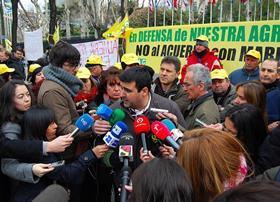
After months of controversy and arguments, the European Parliament has voted in favour of the European Union’s new agreement of association with Morocco, provoking a furious reaction from producer groups in Spain.
At a session in parliament on 16 February, MEPs voted by 369 to 225, with 31 abstentions, to ratify the hugely controversial deal, which will further liberalise trade for a wide range of products, including fruits and vegetables.
The agreement will immediately reduce or remove 55 per cent of EU tariffs on Moroccan agricultural products (up from 33 per cent) and 70 per cent of tariffs on EU products exported to Morocco within 10 years (rising from 1 per cent).
In a statement, the EU said the accord included safeguards allowing only “moderate increases” for certain products, such as tomatoes, strawberries, cucumbers and garlic.
It said seasonal quotas would also be imposed to “counter distortion” of the EU market, adding that Moroccan imports would have to meet European sanitary standards.
In a separate vote, MEPs voted by 398 to 175 to adopt an accompanying resolution, which calls on the European Commission to “monitor strict application of quotas and strengthen controls to avoid alleged fraud in the entry price system”, as well as an assessment of the impact on European producers.
Spanish anger
However, despite the promise of safeguards, the ratification of the deal provoked an angry reaction from Spanish groups, who vowed to fight its implementation.
Major association COAG described the vote as a “tough blow” to Spanish growers, claiming it had “mortgaged the future” of 250,000 farms and threatened 450,000 jobs and €8,500m worth of annual fruit and vegetable exports.
Spain’s national producers’ federation Fepex described the decision as a “sad day for the fresh produce sector”, and claimed MEPs had failed to take into account the “vast” differences between EU and Moroccan production, environmental and employment practices.
However, COAG has vowed to take the Parliament’s ratification to the European Court of Justice, and will argue that the decision should be overturned based on the grounds that the King of Morocco is allegedly ‘illegally’ farming in the country’s disputed Western Sahara territory.
In a statement, COAG’s Andrés Góngora claimed: “We are not going to stand with our arms crossed while the EU abandons Spanish fruit and vegetable producers to chance, enabling to control-free entry of Moroccan products that have been produced with poverty-level wages (€5 per day compared with €50 in Spain), with no social guarantees for workers and with the use of chemicals banned for decades in the EU.”






No comments yet